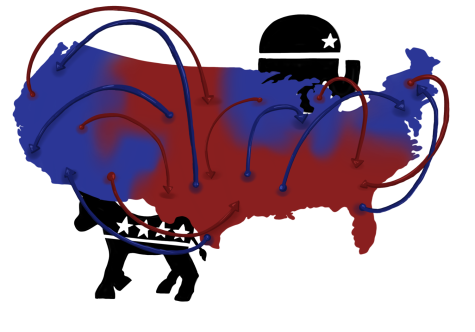The big sort: Privileged political migration in the U.S.
April 1, 2022

If you have read any of my recent articles, it is very evident that the United States has a rapidly growing issue of bipartisan division. Not only are Democrats and Republicans alike moving farther right and left (as 92 percent of Republicans are to the right of the median Democrat, and 94 percent of Democrats are to the left of the median Republican), but there is also a growing sense of disdain for the other side. This continued polarization is making it impossible for many to find common ground, leading to extreme forms of political sorting and migration.
This growing disdain has caused an increase in people using political sorting tactics that serve to surround them with like-minded people and legislation that matches their political beliefs.
Not only are people sorting themselves into parties (which is where the phenomena began) but there has been an increase in political migration, where U.S. citizens are moving to areas that reflect their political preferences, with Democrats and Republicans moving to either red or blue states and counties.
The increase in political migration is creating a division of political opinion and legislation based on location. The problem of political polarization is now becoming increasingly more complicated, as many literally distance themselves from anyone who does not hold similar beliefs as them. This political migration has been termed “The Big Sort.”
It is important to note that this form of sorting has been happening for years, however, the COVID-19 pandemic has exacerbated this problem due to disagreements on mask mandates and legislation on social distancing. The differences in county and state mask mandates have led many Republicans and Democrats alike to uproot their lives in search of “better” policies.
Even before COVID-19, researchers found that “when people migrate, they tend to move to other countries that reflect their political preferences.” For many, the deciding factors of where to live now align with factors like abortion rights and taxes. These factors, however, lead more people to surround themselves only with those who agree with them—ultimately creating more division and disdain for the other side.
Bill Bishop, author of “The Big Sort: Why the Clustering of Like-Minded America is Tearing Us Apart,” wrote “Groups of like-minded people tend to become more extreme over time in the way that they’re like-minded.”
Political sorting has created extremely closed-minded politics that leave very little room for debates and open conversations to develop, which ultimately continues to isolate people from different opinions.
New research shows that political sorting is increasing the amount of “super landslide” counties in presidential elections. According to an article by NPR, “Of the nation’s total 3,143 counties, the number of super landslide counties—where a presidential candidate won at least 80 percent of the vote—has jumped from 6 percent in 2004 to 22 percent in 2020.”
This form of political sorting or segregation will continue to not only affect national elections, but also state and county elections.
I am not against the freedom to choose where one wants to live due to the political ideology and very real laws and legislations that may protect someone’s beliefs in one place compared to another. Instead, I want to show that continued polarization and political extremism will continue to make us more divided and will only cater to people who have the economic capacity to actually move, leaving many people behind. This will create a distinct minority of people lacking political representation.
The distinct difference in legislation on abortion is a key example of how political sorting is creating unequal protections for citizens. Those who do not have the means to choose where to live will have differing rights from those in other counties or states.
Political sorting is a privileged form of migration and will continue to prioritize people who have the means to move. This will lead to not only an increasingly divided country, but will also leave many without financial means scrambling in its wake.




